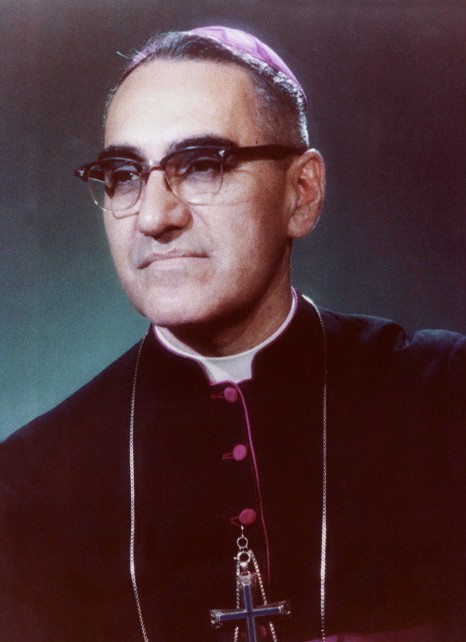Saint Oscar Romero
Feast Day: March 24
In 1917, Oscar Arnulfo Romero y Galdamez was born in El Salvador, a country ruled by a wealthy oligarchy and populated mostly by the landless poor, simmering with economic instability and political unrest. He was trained as a carpenter, and at age 13, he declared that he wanted to be a priest. Oscar entered the seminary and, a few years later, set off for studies in Rome, where he was ordained in 1942.
Back home, Fr. Romero became a parish priest, then a seminary rector, then an auxiliary bishop, while El Salvador’s political landscape grew increasingly fraught. Government forces, paramilitary groups and guerillas became increasingly violent. Masses of the oppressed poor began to organize, speaking out against the misery in which they lived. In this climate, Romero was installed Archbishop of San Salvador in 1977. He was considered a “safe” choice. How could a conservative intellectual who talked about holiness bother anyone?
Three weeks after his installation, Bishop Romero’s friend, Fr. Rutilio Grande, who worked with impoverished farmworkers, was assassinated together with an elderly peasant and a boy. The bodies lay in state at the cathedral. Romero would later say, “When I looked at Rutilio lying there dead, I thought… I, too, have to walk the same path.” In the new bishop, a flicker of resolve stirred. He began to see what the holiness he had desired as a young man would entail.
Fr. Rutilio was not the only person unjustly killed in El Salvador. Every day, people disappeared; peasants were terrorized; priests and church workers who attempted to aid the poor were tortured or killed. The quiet Archbishop found a voice. He denounced the right-wing government and the left-wing guerrillas. He denounced even the government of the United States for supplying the weapons by which his people were killed. His homilies, which gave a weekly list of disappearances, tortures, and killings, had a larger audience than any other radio program in the country.
The Archbishop was painfully aware that the soldiers torturing and killing his people were mostly baptized Christians. He was their shepherd, too, and so he could speak to them with the authority of the Lord. On March 23, 1980, he gave a radio sermon in which he appealed directly to them: “No soldier is obliged to obey an order contrary to the law of God…. It is time now for you to recover your conscience…. Therefore, in the name of God, and in the name of this long-suffering people, whose cries rise to heaven more loudly each day, I beseech you, I beg you, I command you! In the name of God: stop the repression!”
He must have known that he could not speak those words and live.
The Archbishop spent March 24 at a priests’ retreat. At a Mass he celebrated that evening, he preached a homily, saying, “Those who surrender to the service of the poor through love of Christ, will live like the grain of wheat that dies…”. After the homily, he approached the altar. A gunman entered the church and fired.
Oscar Romero became that grain of wheat, offering his blood for the “redemption and resurrection” of his people. In 2018, wearing the bloodstained belt that Romero had on at his last Mass, Pope Francis declared this martyred bishop a saint.
Patronage
Christian Communicators – El Salvador
Source: vaticannews.va

Birthplace
Born
15 August 1917
Ciudad Barrios, El Salvador
Death
24 March 1980 (age 62)
San Salvador, El Salvador
Canonized
14 October 2018 (Pope Francis)
Shrine/Relics/Tomb
Metropolitan Cathedral of San Salvador, San Salvador
Learn more:
Catholic Answers
Was St. Oscar Romero a Martyr – Catholic.com
Dec 30, 2021 — Was the 1980 killing of Archbishop Romero of El Salvador motivated by a hatred of the Faith, or because of politics? That’s the question posed by an essay published in 2015 by the American district of the Society of St. Pius X…
Franciscan Media
Saint Oscar Arnulfo Romero – FranciscanMedia.org
The night before he was murdered while celebrating Mass, Archbishop Oscar Romero of San Salvador said on the radio: “I would like to appeal in a special way to the men of the army, and in particular to the troops of the National Guard, the police, and the garrisons. Brothers, you belong to our own people…
